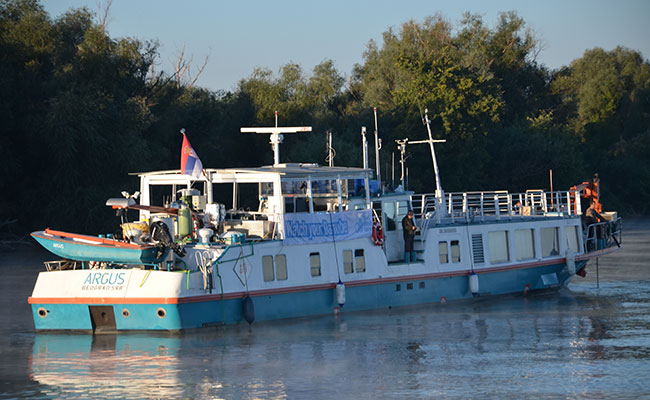Reinhard Liepolt Award to a member of the ICC Water & Health
Reinhard Liepolt Award for Danube Research 2016 awarded to a member of the ICC Water & Health

The research vessel ARGUS at the River Danube during Joint Danube Survey 2013. Picture by: Igor Liska, ICPDR, Vienna
Great success for the ICC Water & Health at the award presentation ceremony of the Reinhard Liepolt Award for Danube Research on September 29, 2016: one of the two main awards was given to Domenico Savio, a PhD student of the ICC Water & Health and the Vienna Doctoral Programme on Water Resource Systems.
The distinguished study was the first that investigated the changes of the genetic composition of bacterial populations along the length of a whole large river, the River Danube, covering a stretch of 2600 km. Samples were taken within the frame of a research expedition in 2007 (Joint Danube Survey 2, JDS), that has been organised every six years by the ICPDR (International Commission for the Protection of the Danube River). Since then, The DNA samples had been stored at -80°C and were analysed retrospectively.
The microbiological part of the expedition was predominantly financed by the Austrian Science Fund (FWF) and was organized by Alexander Kirschner and Andreas Farnleitner. Moreover, essential hydrological expertise for this study came from Alfred Paul Blaschke, Günter Blöschl and Juray Parajka in cooperation with the Vienna Doctoral Programme on Water Resource Systems (www.waterresources.at).
Domenico Savio used cutting edge DNA sequencing technologies for his study and bio-informatic tools specifically developed by a collaboration partner at the University of Uppsala (Alexander Eiler). With this it could be shown for the first time that bacterial populations in the middle of a large river like the Danube change only gradually with only negligible influence by large tributaries or wastewater inflows form large municipalities. On the way downstream, typical groundwater and soil associated bacteria in the upper reaches are gradually replaced by typical freshwater bacteria. These results indicate that the River Continuum Concept originally developed for macro-organisms is also valid for micro-organisms. This is of fundamental value for the understanding of biogeochemical processes in large river systems.
The reference of the article
Savio D, Sinclair L, Ijaz UZ, Parajka J, Reischer GH, Stadler P, Blaschke AP, Blöschl G, Mach RL, Kirschner AK, Farnleitner AH, Eiler A (2015) Bacterial diversity along a 2600?km river continuum. Environ Microbiol.17(12):4994-5007
